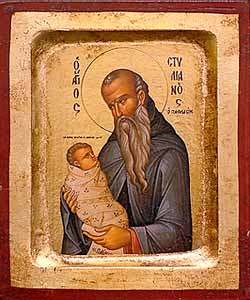Theology
When Should Children Begin to Fast?
8. March 2017 - 13:19  Take possession of your stomach, before it takes possession of you. —St. John Climacus
Take possession of your stomach, before it takes possession of you. —St. John Climacus
How early should children begin fasting? According to the teaching of the ancient fathers, a healthy child begins to fast once it no longer takes its mother’s milk, that is, at around age three. (In ancient times, Jewish women breastfed their infants until they reached three years of age). Along with the need to observe whatever degree of fasting, parents must also take care to prevent their children from forming a habit of overeating, or eating too often, outside of the times established for taking food—eating between meals. St. Theophan the Recluse gives parents advice in this regard: “A child should eat in such a way that while developing and fortifying the body and giving it health, he does not foment flesh-pleasing in the soul. Regardless of how young your child is, he must begin from the earliest years to stabilize the flesh, which leans toward coarse matter, and accustom it to self control, so that in both the childhood and teenage years and beyond, he can easily and freely control this need.”
The Synodikon of the Holy, Great, Ecumenical Council, the Second of Nicaea: 787
3. March 2017 - 14:53 From the Proceedings of the Seventh Ecumenical Council
From the Proceedings of the Seventh Ecumenical Council
The holy, great, and Ecumenical Council, which, by the grace of God and the will of the pious and Christ-loving Emperors, Constantine and Irene, his mother, was gathered together for the second time at Nice, the illustrious metropolis of Bithynia, in the holy church of God which is named Sophia, having followed the tradition of the Catholic Church, hath defined as follows: Christ our Lord, who hath bestowed upon us the light of the knowledge of himself, and hath redeemed us from the darkness of idolatrous madness, having espoused to himself the Holy Catholic Church without spot or defect, promised that he would so preserve her: and gave his word to this effect to his holy disciples when he said Lo! I am with you always, even unto the end of the world which promise he made, not only to them, but to us also who should believe in his name through their word.
A Preparation for Confession
3. March 2017 - 12:56 I, a sinful soul, confess to our Lord God and Savior Jesus Christ, all of my evil acts which I have done, said or thought from baptism even unto this present day.
I, a sinful soul, confess to our Lord God and Savior Jesus Christ, all of my evil acts which I have done, said or thought from baptism even unto this present day.
I have not kept the vows of my baptism, but have made myself unwanted before the face of God.
Discipline of Fasting
28. February 2017 - 11:03 Within this developed pattern of Great Lent, what precisely do the rules of fasting demand? Neither in ancient nor in modern times has there ever been exact uniformity, but most Orthodox authorities agree on the following rules:
Within this developed pattern of Great Lent, what precisely do the rules of fasting demand? Neither in ancient nor in modern times has there ever been exact uniformity, but most Orthodox authorities agree on the following rules:
(1) During the week between the Sunday of the Publican and the Pharisee and that of the Prodigal Son, there is general dispensation from all fasting. Meat and animal products may be eaten even on Wednesday and Friday.
Monday of the First Week of Great Lent
27. February 2017 - 9:27 True fasting is putting away evil deeds. (St. Basil the Great)
True fasting is putting away evil deeds. (St. Basil the Great)
The meaning of fasting consists not simply in refusing meat and dairy products, but most importantly in profound self-knowledge, repentance, and the struggle with the passions. “Let us tear every unrighteous union,” the Church hymns call to us on these days. “If we refrain from meat but devour our neighbors, this is a mockery of the fast,” says patristic wisdom. The true meaning of the fast is clearly revealed in one of the stichera: “Let us abandon bodily passions, and grow the gifts of the soul…” “The Springtime of repentance” is what people in the Church call the time of Great Lent.
Archbishop Nicholas (Kasatkin) of Japan
24. February 2017 - 14:26 First one must conquer love, and only then spread the word – Archbishop Nicholas (Kasatkin).
First one must conquer love, and only then spread the word – Archbishop Nicholas (Kasatkin).
The first person to preach the Gospel in Japan was a Spaniard, Francis Xavier, a Catholic monk of the Jesuit order. The first missionary labors of the Catholic monk and his fellow Jesuit strugglers were crowned with success, and many people accepted Christianity, including the Japanese princes Onugo, Arima and Omura (in the year 1582). However, as the Jesuits focused more on the external, ritualistic aspects of the Faith, on violence and threats, and didnt focus on the spirit of love and humility in their apostolic preaching, they were not able to strengthen the Japanese Christians in the Catholic faith, so that many of them, deep down, remained pagans. Unfortunately, the Jesuit missionary movement was accompanied by politics and intrigue, that is, by a clear and ardent desire to make Japan submit to the Vatican. This caused a negative influence in the hearts of the Japanese, and also led to the harsh persecution of those newly-converted men and women, who had sincerely accepted Catholicism, a fact which is witnessed by a Christian historian in Japan:

